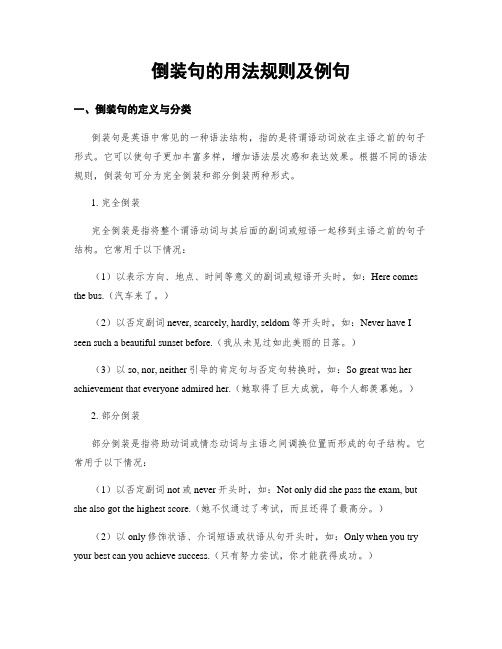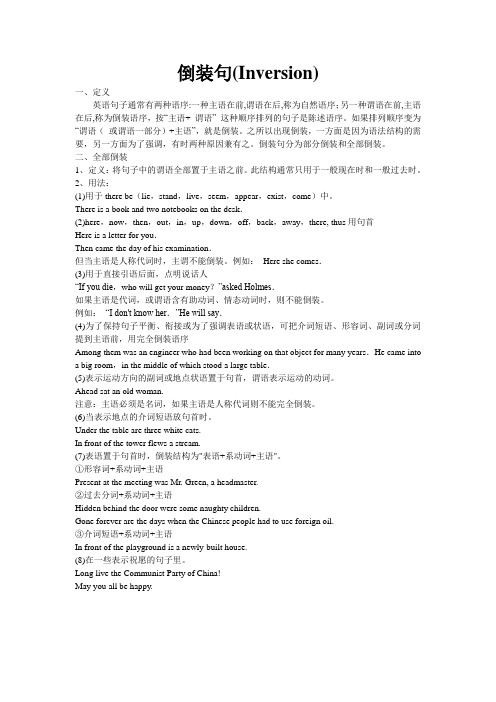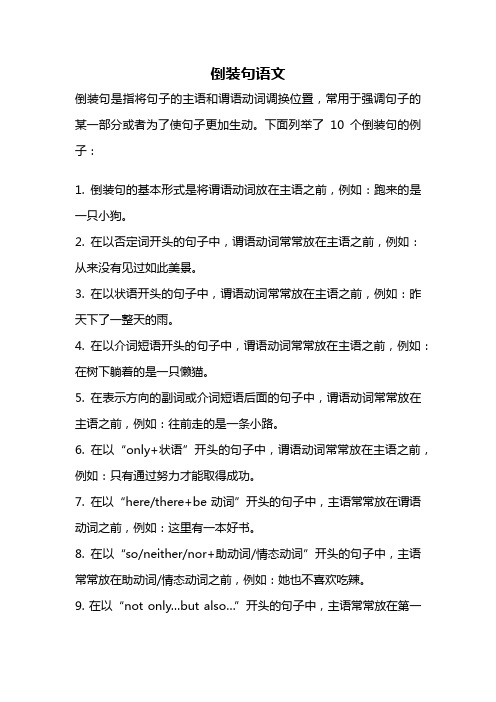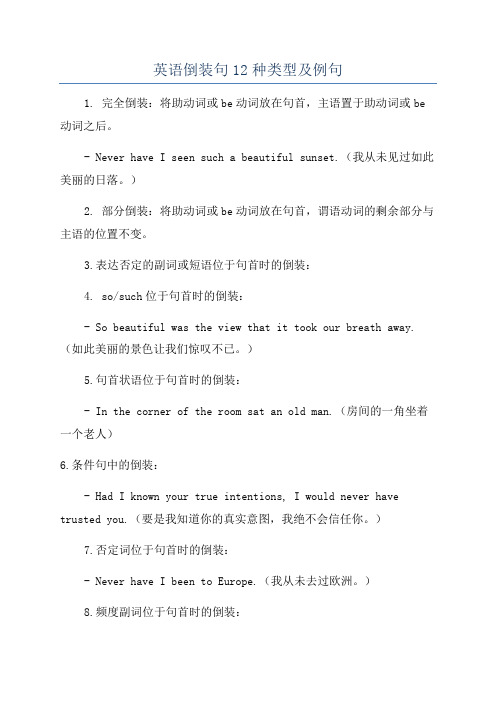倒装句
倒装句的用法规则及例句

倒装句的用法规则及例句一、倒装句的定义与分类倒装句是英语中常见的一种语法结构,指的是将谓语动词放在主语之前的句子形式。
它可以使句子更加丰富多样,增加语法层次感和表达效果。
根据不同的语法规则,倒装句可分为完全倒装和部分倒装两种形式。
1. 完全倒装完全倒装是指将整个谓语动词与其后面的副词或短语一起移到主语之前的句子结构。
它常用于以下情况:(1)以表示方向、地点、时间等意义的副词或短语开头时,如:Here comes the bus.(汽车来了。
)(2)以否定副词never, scarcely, hardly, seldom等开头时,如:Never have I seen such a beautiful sunset before.(我从未见过如此美丽的日落。
)(3)以so, nor, neither引导的肯定句与否定句转换时,如:So great was her achievement that everyone admired her.(她取得了巨大成就,每个人都羡慕她。
)2. 部分倒装部分倒装是指将助动词或情态动词与主语之间调换位置而形成的句子结构。
它常用于以下情况:(1)以否定副词not或never开头时,如:Not only did she pass the exam, but she also got the highest score.(她不仅通过了考试,而且还得了最高分。
)(2)以only修饰状语、介词短语或状语从句开头时,如:Only when you try your best can you achieve success.(只有努力尝试,你才能获得成功。
)二、倒装句的用法规则1. 完全倒装的用法规则完全倒装句中,谓语动词与副词或短语置于主语之前,其主要规则如下:(1)当以表示方向、地点、时间等意义的副词或短语开头时,将动词移到主语之前。
例如:Out rushed the boys to play football.(男孩们冲出去踢足球。
倒装句

倒装句(Inversion)一、定义英语句子通常有两种语序:一种主语在前,谓语在后,称为自然语序;另一种谓语在前,主语在后,称为倒装语序,按“主语+ 谓语” 这种顺序排列的句子是陈述语序。
如果排列顺序变为“谓语(或谓语一部分)+主语”,就是倒装。
之所以出现倒装,一方面是因为语法结构的需要,另一方面为了强调,有时两种原因兼有之。
倒装句分为部分倒装和全部倒装。
二、全部倒装1、定义:将句子中的谓语全部置于主语之前。
此结构通常只用于一般现在时和一般过去时。
2、用法:(1)用于there be(lie,stand,live,seem,appear,exist,come)中。
There is a book and two notebooks on the desk.(2)here,now,then,out,in,up,down,off,back,away,there, thus用句首Here is a letter for you.Then came the day of his examination.但当主语是人称代词时,主谓不能倒装。
例如:Here she comes.(3)用于直接引语后面,点明说话人“If you die,who will get your money?”asked Holmes.如果主语是代词,或谓语含有助动词、情态动词时,则不能倒装。
例如:“I don't know her.”He will say.(4)为了保持句子平衡、衔接或为了强调表语或状语,可把介词短语、形容词、副词或分词提到主语前,用完全倒装语序Among them was an engineer who had been working on that object for many years.He came intoa big room,in the middle of which stood a large table.(5)表示运动方向的副词或地点状语置于句首,谓语表示运动的动词。
倒装句

倒装句倒装句一般分为两大类,第一类:全倒,把整个谓语动词全都放在主语前,eg:Here comes the bus.第二类:部分倒装:指把助动词或情态动词放在主语前。
完全倒装一、全倒:1、地点副词here/them方位副词up/done/in/out/ahead/away/off/back/above等位于句首,如果其后还跟有come/go/follow/arise(出现产生)/be动词,其后主语如果是名次,则全倒,主语是代词不倒。
eg:Here you are(不到装)eg:Here comes the bus=The bus is coming.There goes the bell=there bell is ringing 这种倒装句不用进行时态。
2、时间副词now/then位于句首,如果其后跟有go/come/Hollow/arise/be动词、完全倒装eg:Now comes your turn(主语) to speak(后置定词)3、A boy sat at the gate=A he the gate sat a boy.在原句中作不及物动词状语的地点介词短语位于句首,全倒4、在原句中作表语的形容词及短语或分词及短语位于句首全倒。
My home is next to (adj短语) the school=Next the school is my home5、long live+名词+!意为......万岁......万寿无疆Long live the great people!伟大的人民万岁!(The great people live long.)6、such adj./代词作为代词表示这样的人这样的事或这样的一些人、一些事。
The result is such 结果就是这样的。
做表语的such 更习惯放在句首,形成倒装。
eg:Such is the result 此时be动词单复数取决于后面的名词。
倒装句语文

倒装句语文
倒装句是指将句子的主语和谓语动词调换位置,常用于强调句子的某一部分或者为了使句子更加生动。
下面列举了10个倒装句的例子:
1. 倒装句的基本形式是将谓语动词放在主语之前,例如:跑来的是一只小狗。
2. 在以否定词开头的句子中,谓语动词常常放在主语之前,例如:从来没有见过如此美景。
3. 在以状语开头的句子中,谓语动词常常放在主语之前,例如:昨天下了一整天的雨。
4. 在以介词短语开头的句子中,谓语动词常常放在主语之前,例如:在树下躺着的是一只懒猫。
5. 在表示方向的副词或介词短语后面的句子中,谓语动词常常放在主语之前,例如:往前走的是一条小路。
6. 在以“only+状语”开头的句子中,谓语动词常常放在主语之前,例如:只有通过努力才能取得成功。
7. 在以“here/there+be动词”开头的句子中,主语常常放在谓语动词之前,例如:这里有一本好书。
8. 在以“so/neither/nor+助动词/情态动词”开头的句子中,主语常常放在助动词/情态动词之前,例如:她也不喜欢吃辣。
9. 在以“not only…but also…”开头的句子中,主语常常放在第一
个动词之后,例如:他不仅会唱歌,还会跳舞。
10. 在以“hardly/scarcely…when…”开头的句子中,主语常常放在第一个动词之后,例如:刚出门,就下起了大雨。
以上是10个倒装句的例子,通过倒装句的运用,可以使句子更加生动有力,增强表达的效果。
倒装句是语文学习中的重要知识点,希望大家能够熟练掌握并灵活运用。
倒装句

倒装句倒装(Inversion)是一种语法手段,用以表示一定句子结构的需要和强调某一句子成分的需要。
英语的最基本结构是主、谓结构,倒装就是将这种比较固定的结构加以颠倒。
倒装有两种:将主语和谓语完全颠倒过来,叫做完全倒装(Complete Inversion)。
如:In came a man with a white beard. 只将助动词(包括情态动词)移至主语之前,叫做部分倒装(Partial Inversion)。
如:Only once was John late to class.英语句子的倒装一是由于语法结构的需要(即避免头重脚轻)而进行的倒装,二是由于修辞的需要(即强调)而进行的倒装。
前一种情况,倒装是必须的,否则就会出现语法错误;后一种情况,倒装是选择性的,倒装与否只会产生表达效果上的差异。
一、倒装句之全部倒装全部倒装是只将句子中的谓语动词全部置于主语之前。
此结构通常只用与一般现在时和一般过去时。
常见的结构有:1)now, then, thus, no longer, no more等表示时间的副词置于句首,谓语动词常用be, come, go,等。
例如:Then came the chairman.often, well, many a time, now and again 等方式或频度副词(短语)开头的句子中,要用部分倒装结构。
例如:Many a time has John given me good advice. / Often have we made that test.2)here, there, up, down, in, out, off, away; through the window, in the room, on the wall等表示运动方向的副词或地点状语置于句首,谓语动词常用sit, live, stand, run, come, go, be等。
英语倒装句12种类型及例句

英语倒装句12种类型及例句1. 完全倒装:将助动词或be动词放在句首,主语置于助动词或be 动词之后。
- Never have I seen such a beautiful sunset.(我从未见过如此美丽的日落。
)2. 部分倒装:将助动词或be动词放在句首,谓语动词的剩余部分与主语的位置不变。
3.表达否定的副词或短语位于句首时的倒装:4. so/such位于句首时的倒装:- So beautiful was the view that it took our breath away.(如此美丽的景色让我们惊叹不已。
)5.句首状语位于句首时的倒装:- In the corner of the room sat an old man.(房间的一角坐着一个老人)6.条件句中的倒装:- Had I known your true intentions, I would never have trusted you.(要是我知道你的真实意图,我绝不会信任你。
)7.否定词位于句首时的倒装:- Never have I been to Europe.(我从未去过欧洲。
)8.频度副词位于句首时的倒装:- Rarely do we see such dedication.(我们很少见到如此的奉献精神。
)9.祈使句或祈使句部分的倒装:- Stand up!(站起来!)- Be quiet, please.(请安静。
)10. only位于句首时的倒装:- Only by working hard can you achieve your goals.(只有通过努力工作,你才能实现目标。
)11.地点状语置于句首时的倒装:- In the garden were beautiful flowers.(花园里有美丽的花朵。
)12.宾语置于句首时的倒装:- A love like this I have never felt before.(我之前从未感受过如此的爱。
倒装句
倒装句知识要点:1、倒装句(Inversion)英语的基本语序是“主语+谓语”。
如果将谓语的全部或一部分放在主语之前,这种语序称为“倒装”。
二、倒装结构的基本考点12倒装句【专项训练】1、that we all went out, lying in the sun.A.The weather so fine was B.So fine was the weatherC.So the weather was fine D.So was fine weather2、Under his arm a pair of shoes which he had bought from the shop a few days before.A.is B.are C.was D.were3、who had arrested him three times for carrying drugs.A.Before George stood the policeman B.Before George the policeman stoodC.Before the policeman stood George D.Before George did the policeman4、Then we had been looking forward to .A.came the hour B.the hour came C.comes the hour D.the hour is coming5、Only when he started to explain the reason for this.A.she realized B.did she realize C.she had realized D.had she realized6、succeed in doing anything.A.Only by working hard we can B.By only working hard we canC.Only by working hard can we D.Only we can by working hard7、Not for a moment the truth of your story.A.he has doubted B.he doubts C.did he doubt D.he did doubt8、Nowhere else in the world cheaper tailoring than in Hong Kong.A.a tourist can find B.can a tourist find C.a tourist will find D.a tourist has found 9、Hardly when the bus suddenly pulled away.A.they had got to the bus-stop B.they got to the bus-stopC.did they get to the bus-stop D.had they got to the bus -stop10、Mary doesn’t speak French, and does Joan.A.not B.neither C.either D.so11、—Do you know Jim quarrelled with his brother? —I don’t know,.A.nor don’t I care B.nor do I care C.I don’t care neither D.I don’t care also 12、Not until the early years of the 19th century what heat is.A.man did know B.man knew C.didn’t man know D.did man know13、After that we never saw her again nor from her.A.did we hear B.we heard C.had we heard D.we have heard14、John won the first prize in the contest. .A.So he did. B.So did he. C.So he did, too. D.So did he, too.15、,he doesn’t study well.A.As he is clever B.He is as clever C.Clever as he is D.As clever he is16、You can never use my tape recorder. time should you touch that machine.A.At no B.At any C.Any D.No17、Scarcely the room the phone rang.A.I had entered…when B .had I entered…thenC. had I entered…whenD. have I entered…when18、Only save his life.A.can the doctor B.the doctor can C.will the doctor D.could the doctor19、Hardly anybody the boy , because he is rude.A.does like B.likes C.do like D.like20、So well that the teacher praised her.A.she had done her homework B.her homework had been doneC.did she do her homework D.she did her homework21、Only when to know him will you get along with him.A.do you come B.will you come C.you come D.you will come22、Out , gun in hand.A.did he rush B.rushed he C.he rushed D.had he rushed23、He had promised me to come to the party ,and .A.so did he B.so he did C.so he would D.so would he 24、Into the sky the light blue smoke.A.went up B.up went C.did go up D.had gone up25、Little about his own life at the meeting.A.did he talk B.he talked C.he was talking D.had he talked26、Under no circumstances first use nuclear weapons.A.will China B.China will C.does China D.do China27、taken that examination, she could have passed it .A.Were she B.Had she be able to C.If she would have D.Had she28、tomorrow , we would put off the match till next Monday.A.Should it rained B.Were it to rain C.If it would rain D.Had it rained29、Look, here .A.Mr. Brown comes B.does Mr. Brown come C.comes Mr. Brown D.Mr. Brown has come 30、Often us good advice.A.did she give B.she did give C.she gave D.she has given31、Not until I began to work how much time I had wasted.A.didn’t I realize B.did I realize C.I didn’t realize D.I realize32、Little about his own safety , though he was in great danger himself.A.does he care B.did he care C.he cares D.he cared33、began our new lesson.A.But B.Thus C.Such D.So that34、By no means look down upon the poor.A.we should B.we should not C.do we D.should we35、Only when 30 years old to learn English.A.was he , did he begin B.he was , he beganC.was he , he began D.he was ,did he begin36、Not once their plan.A.did they change B.they changed C.changed they D.they did changed 37、“It’s very hot today.”“.”A.So it is B.So is it C.So does it D.So it does38、A fish needs water and without water it will die.A.So does a man B.So will a man C.So it is with a man D.So is it with a man 39、They arrived at the farmhouse, in front of which .A.sat a small boy B.a small boy sat C.is sitting a small boy D.a small boy sitting 40、_____were his words.A.Such B.But C It D.That14.8 倒装练习1. Only when you have obtained sufficient data ______ come to a sound conclusion.a. can youb. you canc. would youd. you would2. ______ that this region was so rich in natural resources.a. Little he knewb. Little did he knowa. Little he did know d. Little he had known3. Never again ______ political office after his 1928 defeat for the presidency.a. Alfred E. Smith seriously soughtb. seriously Alfred E. Smith soughtc. when did Alfred E. Smith seriously seekd. did Alfred E. Smith seriously seek4. Only in recent years ______ begun to realize that wild dogs, kept within bounds, often do more good than harm.a. people haveb. since people havec. have peopled. people who have5. _______, we were not going to make any concessions to his unreasonable demands.a. What may comeb. Come what mayc. May what comed. What come6. Not until I shouted at the top of my voice ______ his head.a. that he turnedb. did he turnc. he didn’t turnd. he had turned7. ______ received law degrees as today.a. Never so women haveb. The women aren’t everc. Women who have neverd. Never have so many women8. Heat does not travel by convection in solid, because the solid does not move, ______.a. so does a liquidb. so a liquid doesc. as does a liquidd. so is a liquid9. On no account ______ to anyone.a. my name must be mentionedb. must my name mentionc. must my name be mentionedd. my name must mention10. ______ that they may eventually reduce the amount of labor needed on construction sites by 90 percent.a. Such construction robots are cleverb. So clever the construction robots arec. So clever are the construction robotsd. Such clever construction robots are11. ______ do we go for picnics.a. Certainlyb. Sometimesc. Seldomd. Once12. ______ is it only the ignorant and ill-educated person who has such faith in the bottle of medicine.a. Eitherb. Oftenc. Nord. Usually13. Her answer is not acceptable, and ______.a. neither am Ib. either is minec. neither is mined. mine is neither14. ______, I must do another experiment.a. Be it ever so lateb. It is ever so latec. It be ever so lated. So late it be ever15. So fast ______ that it is difficult for us to imagine its speed.a. light travelb. travels the lightc. do light traveld. does light travel16. A sneeze cannot be performed voluntarily, ______ be easily suppressed.a. nor it canb. nor can itc. it cannotd. and cannot it17. ______ notebook and report that I promised you last week.a. Here is theb. Here are thec. Is here thed. Are here the18. ______ a little more time to think, he might have acted more sensibly.a. If he tookb. If he has takenc. had he takend. Should he take19. Beneath our feet ______ that our life depends on for food and clothing.a. the earth layb. the earth liesc. lie the earthd. lies the earth20. ______ the beginning of the 19th century did scientists know that all matter is made up of atoms.a. Atb. Byc. Up tod. Not until21. Hardly ______ he got out of the court ______ the reporters raised a lot of questions to him.a. had … whenb. had…thanc. did…whend. has…than22. Among these books ______ a dictionary that his father gave him as a birthday present.a. have includedb. is includedc. has includedd. are included23. No longer are contributions to computer technology confined to any one country; ______ is this more true than in Europe.a. nowhereb. hardlyc. littled. seldom24. Important ______ his discovery was, it was regarded as a matter of no account in his time.a. tob. forc. asd. although25. According to the periodic table, ______ still some elements undiscovered.a. there seem to beb. it seemsc. it seems to bed. here seems26. Here ______ you want to see.a. the manager comesb. comes the managerc. comes a managerd. is coming a manager27. Barry can hardly drive a car, ______.a. so can’t Mollyb. can’t Molly eitherc. Molly can’t to od. neither can Molly28. _______ for the leadership of the Party, we should not have succeeded.a. Had not it beenb. Had it not beenc. There wasd. Is there29. ______ no air or water, there would be no life in the world.a. Were thereb. There arec. There wasd. Is there30. Not only ______ the data fed into it, but it can also analyze them.a. the computer can memorizeb. can the computer memorizec. do the computer memorized. can memorize the computer31. Not once ______ his view of life.a. did the gentleman mentionb. the gentleman mentioned thatc. the gentleman mentionedd. does gentleman mentioned32. By no means ______ their own language well.a. it is true that all English people knowb. is it true that do all English people knowc. it is true that do all English people knowd. is it true that all English people know33. The molecules of gases move more freely than ______.a. do liquids and solidsb. liquids and solids doc. do those of liquids and solidsd. those do of liquids and solids34. The world’s birth rates are on a decline and ______ are the death rates.a. sob. alsoc. tood. the same35. _____ is the volume of chemical goods.a. Constantly growing toob. Too constantly growingc. Growing constant tod. Too growing constant36. Many a time _______ me with my English study.a. have he helpedb. has he helpedc. he have helpedd. did he have helped37. Typical of the new type of young people ______, who set a shining example to the whole nation.a. was Lei Fengb. Were Lei Fengc. Lei Feng wasd. Lei Feng were38. What Mr. Smith did was important , but ______.a. more important the way of he did things wasb. the way of he did things was more importantc. more important was the way he did thingsd. more important the way were he did things39. She didn’t want to buy it, ______.a. however good was itb. however good it wasc. for how good might it bed. for how good it might be【答案】:1、B2、C3、A4、A5、B6、C7、C8、B 9、D 10、B 11、B 12、D13、A 14、A 15、C 16、A 17、C 18、B19、B 20、C 21、C 22、C 23、B 24、A25、A 26、A 27、D 28、B 29、C 30、A31、B 32、B 33、B 34、D 35、D 36、A37、A 38、C 39、A 40、AⅡ、41、was he —he was 倒装主句不倒装从句。
倒装句
倒装是将语句中的主语、谓语、宾语、状语等颠倒顺序的一种语法现象,常常具有强调语气,英语倒装倒装是一种语法手段,用于表示一定的句子结构或强调某一句子成分。
倒装句有两种:完全倒装和部分倒装。
1、完全倒装1) 完全倒装即把整个谓语放到主语之前(是整个谓语动词,而非助动词)。
例如:The teacher came in and the class began.(没有倒装)In came the teacher and the class began. (老师走了进来,然后开始上课。
)2) there引出的完全倒装句:除了最常见的there be句型以外,there还可以接appear,exist,lie,remain,seem to be,stand等,一般都译成"有"的含义,构成完全倒装句。
例如:There appeared to be a man in black in the distance.(远处有个穿黑色衣服的人。
)3) 由地点和时间副词引出的完全倒装句:以地点副词here,there和时间副词now,then 开头,后面的动词是be,come,exist,fall,follow,go,lie,remain,seem,stand等,而主语又是名词时,构成完全倒装句。
Up climbed the boy when his mother came. 4)表示运动方向的副词或地点状语置于句首,谓语表示运动的动词且主语是名词时使用完全倒装5)在强调状语时1)当句首状语为方位词或拟声词,谓语动词为go,come等表示位置转移的动词时句子须倒装。
例如: 1 Up went the plane. 2 In came the chairman and the meeting began. 注:如果主语是代词则不发生倒装。
例如:1 Out they rushed! 2 Lower and lower he bent. (2) 当句首状语为表示地点的介词词组时,句子须倒装。
倒装句的三种形式
倒装句的三种形式
一、倒装的类型
1、部分倒装
部分倒装是指,将句中主语和谓语的关系进行反转,使句子结构发生变化,以更好地表达句子的意思。
这种倒装的形式有两种:(1)对称倒装
它是指将主要句部分的主语和谓语完全倒换位置,使句子拥有主谓结构,但不改变句子的意思。
对称倒装的表现形式是:在句子中,主语放在谓语之前,用关系代词或不定式引导。
主语+关系代词/不定式+谓语
例如:Here comes a bus. → A bus comes here.
(2)非对称倒装
非对称倒装是指将句子的主谓结构倒置,但谓语动词的形式发生变化,造成句子意思的改变。
非对称倒装常用表现形式有:在句子中,主语放在谓语之前,用助动词短语引导或者用疑问词引导。
主语+助动词短语 /疑问词+谓语
例如:I am a student. → Am I a student?
2、完全倒装
完全倒装是指,将句子整个结构发生反转,使句子的主语出现在谓语词句之后,从而改变句子的意思。
完全倒装的表现形式有:用助动词短语引导,或者用疑问词引导。
- 1 -。
倒装句
倒装一、概说句子主语通常是在谓语之前,这种语序称为自然语序,也叫正常语序。
若谓语动词在主语之前,这种语序称为倒装语序。
谓语动词全部置于主语前的,叫完全倒装,只有一部分(通常是助动词,情态动词或be动词)置于主语前面的,叫部分倒装。
如:She is a nice girl.(正常语序)她是一个好女孩。
Is she a nice girl?(倒装语序)她是一个好女孩吗?二、倒装的几种情况(一)完全倒装1. Here, There, Now, Then等副词放在句首时,句子要完全倒装,谓语动词常用come, go, be, lie, run 等。
例如:There comes the bus! 公共汽车来了。
There goes the train!火车走了。
Now comes your turn.现在轮到你了。
2.表示方位的副词in, out, back, up, down, off, away 等置于句首时,句子要全部倒装,句子的谓语动词常是come, go等表示运动的词。
如:The door opened and in came the headmaster.门开了,校长走了进来。
Out ran a little boy.一个小男孩跑出去了。
3.表语提到句首,采用完全倒装:“表语 + 系动词 + 主语”。
(进行时态也可这样)。
Present at the meeting are some famous scientists.出席会议的是一些著名的科学家。
Gone are the days when we used the foreign oil.我们用洋油的日子一去不返了。
Hanging on the wall is Tom's Jacket.挂在墙上的是汤姆的夹克。
Near the factory was a hospital.工厂附近有一家医院。
斯密斯先生就是这样一个人。
①上述完全倒装句子中主语若为人称代词,应放在在动词前:Here comes Mr. Lee. →Here he comes.Away went the students. →Away they went.②有时为了句子的平衡或强调,将表语置于句首,也属于全部倒装。
- 1、下载文档前请自行甄别文档内容的完整性,平台不提供额外的编辑、内容补充、找答案等附加服务。
- 2、"仅部分预览"的文档,不可在线预览部分如存在完整性等问题,可反馈申请退款(可完整预览的文档不适用该条件!)。
- 3、如文档侵犯您的权益,请联系客服反馈,我们会尽快为您处理(人工客服工作时间:9:00-18:30)。
D: 在含有had/were/should的虚拟条件句中
在含有had/were/should的虚拟条件句中可以省略if,将 had/were/should放在主语之前。构成部分倒装。 Were it to rain, the crops would be saved.
The witness was told that under no circumstances should he lie to the court.
G: “may” 表示祝愿
May you have wonderful holiday! May they live long. May you have a nice trip.
H:以 as ,though引导的让步状语从句
以 as ,though引导的让步状语从句中,表语放在句首时,若主 语是名词,主语可以倒装也可以不倒装。主语是代词时,不倒装。 (as 引导让步状语从句时不可置于句首,把做表语的形容词, 名词,动词,和副词提到as前
代词做主语时,主谓语序不变
Here it is. In he comes.
b:表示地点,时间,方向等介词短语放在句首时全 部倒装。
In my heart was desire to live more dangerously. In front of the village runs a babbling brook.村前流淌着 一条潺潺的小溪 On the desk lie several books.
C:分词短语置于句首时的全部倒装
Lying on the floor was a boy aged about twelve. Seated in the front were the guests.
d:"predicaive+link verb+subject"结构中的全部倒装 Present at the meeting were experts on Psychology. Many and long were the conversations they held through the prison way.
Terrible as was the storm, we continued our way.
Child though/as he was ,he was able to stand on his own feet.
Search as they would ,they could find nobody in the house.
特殊疑问句中,如果疑问句作主语或修饰主语时,无须倒装。
Who let out the secret?
是谁泄露的秘密?
What color is the new carpet?
新地毯是什么颜色的?
B: only +adverbial/adverbial clause位于句首时
Only in the small town does he feel secure and relaxed. Only in your own heart can you find the true peace.
F: “so ,neither, nor’ are put in sentence▬initial
She has been to Norway and so have i. -I can’t answer the question. -Neither/nor can Peter.
So 位于句首时,需要具备以下3个条件才可以讲主谓部分倒 装。 so 表示“也”的意思2:上诉是简单句的肯定句3:主语 与so 引导的主语不同,so作“是的,的确”不倒装 I promised to buy my son a nice gift, and so I did.
partial inversion(部分倒装) 由于语法和修辞的的原因将助动词(包括系动词,情 态动词等)提到主语前面,这种称为部分倒装。 a:Interrogative sentence
一般疑问句,将助动词置于主语之前,构成语法倒装,以疑问 词为宾语,表语或状语的特殊疑问句需要将疑问词置于句首, 将助动词置于主语之前,构成语法倒装: Do you like reading Price and Prejudice? Have you heard from Jane lately?
full inversion partial inversion
full inversion (全部倒装)
definition:把整个谓语提到主语前面就称为完全倒装
predicate +subject
a: 表示地点,时间,方向的副词放在句首时的全部倒装
表示方向,时间,地点的副词如: in ,out ,down,up,off,back,away,over there,there, now,then,here,first等放在句首,若主句是名词而不是代词时, 全部倒装。 Down come all of you. 你们都下来 Now comes your turn. 现在轮到你了
C: 表示否定意义的副词或连词放在句首时的部分倒装。
Such as: not ,little ,hardly, never, no sooner …than, hardly/scarcely…when…,not only…but also…,at no time, by no means, on no condition ,in no case ,seldom等 Seldom do I go out alone in the evening. No sooner had I got home than it began to rain.
E: So …that…的so出现于句首时的部分倒装
在 So …that… 句式中,如果是so引导的部分前置,主句中的 主语和谓语需要部分倒装。 So carelessly did he drive that he almost killed himself. So fast do you speak that I can hardly follow you.
